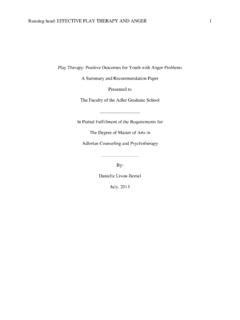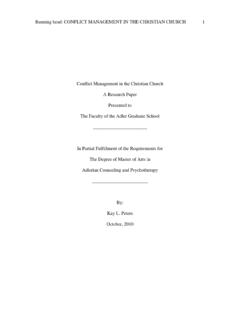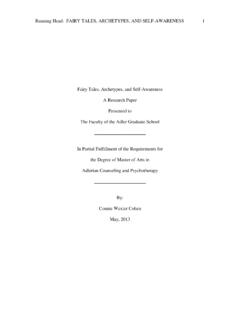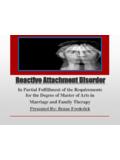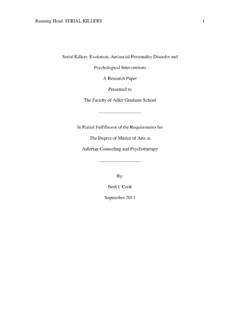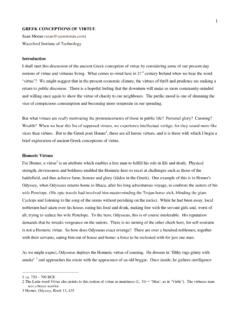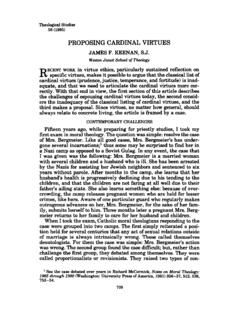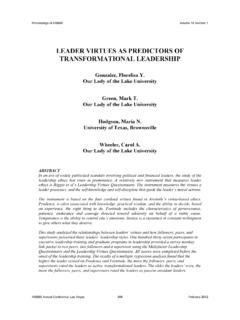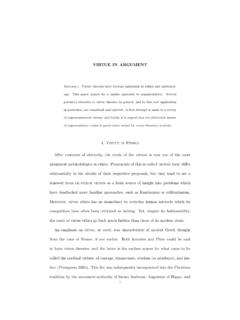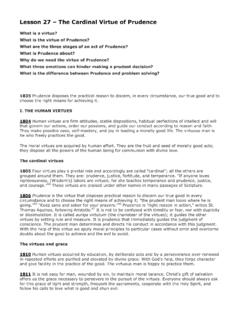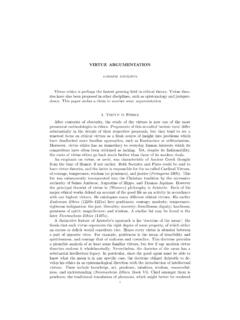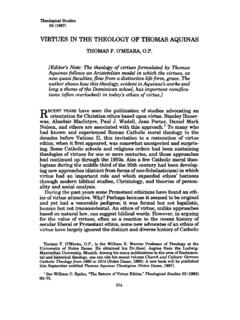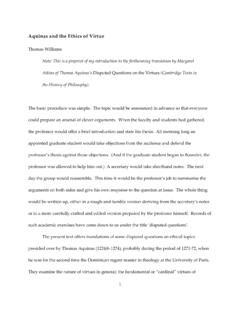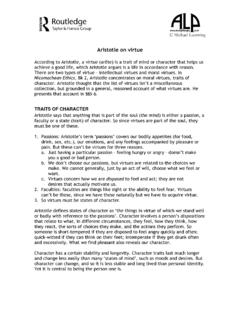Transcription of Hope 1 Running head: HOPE: THE ESSENTIAL THERAPEUTIC …
1 hope 1 Running head: hope : THE ESSENTIAL THERAPEUTIC FACTOR hope : The ESSENTIAL THERAPEUTIC Factor _____ In Partial Fulfillment of the Requirements for the Degree of Master of Arts in Adlerian Counseling and Psychotherapy _____ By: Sarah Jane Winger May 2010 hope 2 Acknowledgements I would like to give thanks to everyone who has been a part of this endeavor and everyone who has helped and supported me throughout my life. Without you I would not be where I am today. hope 3 I said to my soul, be still, and wait without hope For hope would be hope for the wrong thing; wait without love For love would be love of the wrong thing; there is yet faith But the faith and the love and the hope are all in waiting Eliot, Four Quartets (1971). hope 4 Abstract hope is an ESSENTIAL factor in psychotherapy as it's possession by client and therapist alike is required for positive movement in therapy.
2 This paper examined hope as a common factor, the importance of hope in the THERAPEUTIC setting, its role in early THERAPEUTIC change, and techniques for creating and fostering hope in both group and individual therapy. This paper also examined the consequences of hopelessness, depression, despair and hopelessness' ultimate danger: suicide. This paper also looked at hope through an Adlerian lens by examining the connection between Individual Psychology and encouragement. hope 5 Table of Contents hope : The ESSENTIAL THERAPEUTIC Factor 6 hope in Mythology 6 hope in Philosophy 7 hope in Psychology-- an Introduction 9 hope as emotion and cognition 10 hope as a Common Factor 12 hope in early THERAPEUTIC change 15 Creating hope in Group Therapy- The Instillation of hope 16 Building hope in Individual Therapy 18 Keeping hope Alive- In the eyes of the therapist 22 Keeping hope Alive- In the eyes of the client 24 Snyder's
3 hope Scale 25 Alfred Adler, hope , and Encouragement 27 Hopelessness 30 The Hopelessness Theory 31 The Helplessness-Hopelessness Theory 32 Suicide 33 Conclusion 35 References 37 hope 6 hope : The ESSENTIAL THERAPEUTIC Factor hope , as defined by the Webster's new Universal Unabridged Dictionary, is a desire accompanied by an expectation or belief in fulfillment or success. hope is one of the oldest vehicles of human development and through an interdisciplinary examination, hope is defined in the many contexts through which it surfaces including, but certainly not limited to, mythology, philosophy, and psychology.
4 hope in Mythology Hesiod was a Greek poet that was believed to live in the eighth century. In his poem, Works and Days, he tells the myth of Pandora. Pandora was a woman Zeus ordered created by Hephaestus to punish men. Hephaestus molded her out of earth and each god contributed to her completion by giving her a unique gift. Athena taught her needlework and weaving; Aphrodite shed grace upon her head and cruel longing and cares that weary the limbs (Hawthorne, 1967) Hermes gave her a shameful mind and deceitful nature and the power of speech, putting in her lies and crafty words. Athena clothed her and then she, Persuasion and the Charites adorned her with necklaces and other finery. Then Horae adorned her with a garland crown. Finally Hermes gave her the name Pandora, meaning all gifted as all the Olympians gave her a gift. According to the myth Pandora and a jar, said to contain more gifts, are given to Epimetheus from Zeus. Against caution by his brother Prometheus, Epimetheus accepted Pandora and her jar as gifts from the gods.
5 One day, out of simple curiosity Pandora, against Zeus' instruction, opened the jar releasing all the evils of mankind. Instantly sickness, poverty, jealously and revenge, along with disease and plague were released into the earth. Realizing what she had done, Pandora quickly resealed the jar. Everything except hope was released from hope 7 the jar. It is thought that hope was left to comfort the humans in the face of the evils that were now loose in the world (Hawthorne, 1967). hope in Philosophy hope is a virtue that has been historically discussed in the context of uncertainty. Although hope originated as a virtue, by definition meaning an attribute of moral good, the twentieth century has seen the evolution of hope as an attitude stripped of moral content (Elliot, 2005). Augustine of Hippo (354-430 BCE) assumed hope to be future oriented and thus based on uncertainty. He regarded the notion of good as intrinsic to the notion of hope and claimed, only with things that are good and which lie in the future and which have a relevance to him who is said to entertain it.
6 (Elliot, 2005). aristotle (384-322 BCE), the founder of virtue ethics, did not address hope specifically but his writings (and those of Augustine) were expanded upon by Aquinas. Faith, hope and love (charity) were added to the Greek list of virtues and Aquinas used and appropriated aristotle 's writing on virtue to develop his own theories. To distinguish the newer virtues (faith, hope and love) from the aristotle 's cardinal virtues of justice, prudence, courage and temperance, Aquinas labeled these theological virtues . The theological virtues were said to be based on God, rather than anyone or anything else, thus faith was faith in God, hope was hope in God and Love was love in God. Aquinas identified hope as a morally good disposition and believed that hope was connected to the future and to uncertainty. Aquinas thought that this enabled a believer to avoid the morally bad attitudes, or vices of despair and or fear. Baruch Spinoza (1632-1677), a 17th century Dutch philosopher disagreed with Aquinas and believed that hope and fear were interdependent.
7 He defined hope as simply an inconstant hope 8 pleasure which has arisen from the image of a thing that is future or past, about whose outcome we are in doubt, and Fear, on the contrary, is an inconstant pain which has also arisen from the image of a thing that is doubtful. Spinoza explained their co-existence: When someone is hoping for something and doubts whether it will occur, he/she feels the pain of fear. When he/she is fearing something and doubts whether it will occur, he/she feels the relief of hope . Spinoza was likely unimpressed with both hope and fear and argued that they, like other states that arise from them such as confidence, despair, and joy are indications of ignorance and weak-mindedness. Spinoza much preferred reason and certainty to mere hope , and implicit in his thought was the idea that reason will deliver certainty whereas hope in God is uncertain. The power in reason would give human beings the power to get certainty, thus eliminating the need for hope .
8 Spinoza was rejecting of the uncertainty that according to Augustine and Aquinas was ESSENTIAL for hope . David Hume (1711-1776), an 18th century Scottish philosopher, considered fear and hope to be the most important instances of what he called direct passions and labeled hope as fear's opposite. Hume claimed when either good or evil is uncertain, it gives rise to fear or hope , according to the degrees of uncertainty on one side or the other. Hume believed that certainty of good or evil would give rise to grief or joy; the mere possibility of good or evil coupled with uncertainty, would give rise to hope and fear. When the chances were equal both fear and hope might arise. Central to living a moral life, Immanuel Kant (1724-1804), an 18th century German philosopher asked For what may we hope , given that we do our duty? Kant regarded moral duty as something to be done irrespective to and even in the face of (possibly oppositional) hope 9 emotions.
9 By the power of our wills, using our reason, human beings were to obey the Moral Law, irrespective of how they felt. Kant argued that, All the interests of my reason, speculative as well as practical, combine in three following questions: What can I know? What ought I to do? What may I hope ? (Elliot, 2005). For the question theoretical and practical, What may I hope ? Kant derives his answer from his concept of the highest good and ultimately from the idea of God. A human being may only hope for happiness on the grounds that God will make the necessary casual connection between mortality and happiness so that individual human beings get the happiness they each deserve. Again uncertainty is crucial for hope as all human beings can do is hope for their reward, they cannot be certain of it. hope in Psychology-- an Introduction hope first received attention from the fields of medicine and psychology in the 1950's and 1960's when Karl Menninger (1959) and others defined it as positive expectancies for goal attainment.
10 In his 1959 address to the American Psychiatric Association, Karl Menninger exhorted his colleges to recognize the power of hope - their own as well as their patients' in understanding and treating mental illness. He wrote, Are we not now duty bound to speak up as scientists, not about a new rocket or new fuel or new bomb or new gad, but about this ancient but rediscovered truth, the validity of hope in human development. hope , alongside of it immortal sisters, Faith and Love (Menninger, 1959, p. 491). Although people seek counseling and psychotherapy for a number of different reasons, each and every client seeks help with one factor in common, hope . hope , present in even the smallest of degrees, involves the desire and belief that things can be different. hope contains the hope 10 belief that by seeking some sort of help, assistance, or outside influence, change is possible. hope is the one factor that extends across all demographics: all cultures and ethnicities, religions, ages, genders and sexual orientations and between all clinical presenting problems: from substance abuse to depression, domestic violence to anxiety, relationship issues to developmental concerns.
